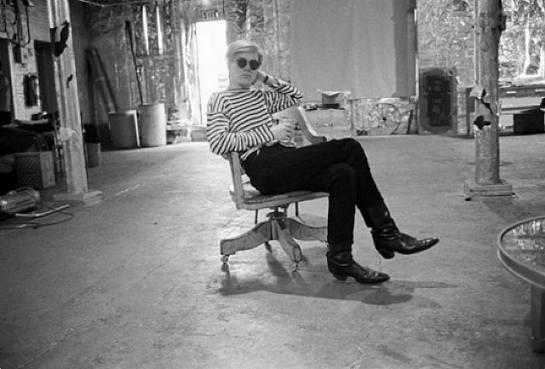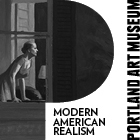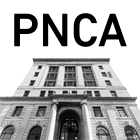
|
||
|
Portland art blog + news + exhibition reviews + galleries + contemporary northwest art
|
||
PICA Launches Precipice Fund Rather famously, Andy Warhol's Factory was the nexus of difficult to categorize cultural activities... catalyzing in one of the greatest nexuses of cultural production ever. The Factory's chaos was frankly stimulating... echoing other great cultural moments like Berlin during the Weimar Era, the New York School or The Surrealists in Paris.

Andy Warhol at The Factory Similarly, In the past decade+ Portland has undergone a renaissance in difficult to categorize (call it boundary pushing) alternative art projects and spaces. This fermenting stew of artist-driven activity IS perhaps the most interesting thing about the Portland scene. Unfortunately, that type of activity (on boats, in garages and warehouses) is incredibly difficult for older style venues and granting agencies to grapple with. Their more old fashioned criteria are preoccupied with; tangible craft, academic resumes and the persistence of their own pristine white walls. This schism has required action for quite some time, and I'm relieved to break this story now that someone has taken a bold new step towards addressing it. Leave it to the Andy Warhol Foundation and PICA to provide much needed movement in the support of what makes Portland such a vital arts city with the Precipice Fund of regifting grants. Consisting of 15-20 small grants for a total of $75,000 per year the fund targets "unincorporated" arts activities like alternative spaces or artist collectives. As an extension of the Warhol Foundation's regional regranting program, already successfully administered by institutions like Diverse Works in Houston and Southern Exposure in San Francisco. In fact, in many ways this funding initiative is in keeping with Warhol's own penchant for creating a catalytic environment for talented people whose process follows the more unpredictable path. Getting one of these regrants will also be morale boosting and a way to vet these often ephemeral projects... giving practitioners a ladder to perhaps step up to the next level. This project is also noteworthy for the altruistic nature of regranting... because institutions who undertake this sort of activity ultimately must designate already scarce resources to the management of these programs, which ultimately do not reflect that institution's specific agenda. No traditional museum (which is organized around a collection) or a school could do this. It is true that these projects sometimes get funding from OAC and RACC but it is on a very ad hoc basis. This funding is tailored to the fact that an interesting art practice doesn't do well with traditional reporting methods and metrics because the projects themselves have ever changing goals and outcomes based on the pragmatioc experience of executing these projects. Here is the Official PR: "PICA is proud to announce The Precipice Fund, a major new granting initiative for Portland based unincorporated visual art collectives, alternative spaces, and collaborative projects. Formed with the support of the Andy Warhol Foundation for the Visual Arts, The Precipice Fund expands Warhol's Regional Regranting Program to the Northwest, creating new channels of support for "vibrant, under-the-radar artistic activity." Rachel Bers, Program Director for the Andy Warhol Foundation for the Visual Arts, explains that, "by partnering with leading cultural institutions in communities across the country, the program allows the [Warhol] Foundation to reach the population of informal artist collectives and to support their alternative gathering spaces, publications, websites, events, and other projects. Through The Precipice Fund, PICA hopes to award between 15 and 20 small grants, ranging from $500 to $5,000, for a total of $75,000 annually. The Warhol Foundation has made the award for two years of re-granting programs, with the potential for continued commitment; the longest running regional re-granting program (at San Francisco's Southern Exposure) has been in operation since 2007. With the founding of Precipice, PICA joins four established re-granting funds in San Francisco (Southern Exposure); Kansas City, MO (Charlotte Street Foundation and Spencer Museum of Art); Chicago (Threewalls and Gallery 400); and Houston (Diverse Works, Aurora Picture Show, and Project Row Houses). Portland is a natural location for the re-granting program to expand; as PICA's Visual Art Curator Kristan Kennedy describes the local scene, "Artist-run organizations, initiatives, and projects don't only fill the gaps in our art ecosystem, they ARE our ecosystem." Bers observes that, "Portland is home to a thriving self-organized art scene and PICA has a deep understanding of and commitment to the artists that live and work there. The foundation is looking forward to working with PICA to support experimental and ambitious projects in the region." "Now is the right time for PICA to take on this role in the local community," remarks PICA Artistic Director Angela Mattox. "With our recent move to a new space and an expanded artistic presence outside of the TBA Festival, we're exploring how we can be even more generative of artistic ideas. Precipice will be a valuable complement to our other channels of support." According to Kennedy, this new fund will, "allow PICA to formalize support for these vital projects and to ensure that they remain where they want to be: on the edge of the city, on the edge of practice, on the edge of an institutional structure." The Precipice Fund will deliver support to unincorporated visual artist groups, informal organizations, and initiatives based in Portland, Oregon, who are presenting new work in informal, but significant ways. Recipients must have a public presence, intersect with diverse audiences, and contribute to the vitality of contemporary art practice. Grantees will be selected by a panel of their peers, comprised of curators and artists from within and outside of the region. Precipice will run independently of PICA's own visual art programming: PICA staff will not influence the granting decisions, and award recipients must present their funded projects outside of PICA. Full application details and granting guidelines will be available April 1, with the first round of awards being determined in Fall 2013. Further announcements are forthcoming as the program is fully implemented." More: I met with Kristan Kennedy and Patrick Leonard to discuss the details of this initiative. here are some important takeaways: 1) For now the fund will focus mostly on the Portland area, though components can involve areas outside of Portland. 2) This does not effect PICA's programming or redirect funds from the Warhol Foundation... these are completely new funds devoted specifically for regranting. 3) First grants will be made in the Fall of 2013. 4) The panels that award grants will consist of individuals with deep backgrounds in these sorts of informal art projects. This very specialized expertise and experience is crucial as RACC and OAC panels often lack depth or a concentration of this kind of contemporary art expertise. They have their process, which is fine but innovative excellence is not something that a typical "public style" panel is qualified to determine (the scoring of various aspects is somewhat arbitrary and thus suspect). This regranting compliments other funding sources by placing a premium on the artist's process rather than a government agency's process. 5) Kristan Kennedy has been working on this for over 6 years and last year sat on Southern Exposure's regranting panel in San Francisco. Kristan has roots in this sort of alt activity appearing in the ground breaking 1999 Oregon Biennial with her Swallow Press project... 6) Each city's regranting program is custom tailored to that city... the fact that the Warhol Foundation felt Portland needed this (and DOES IT EVER!) says great things about Portland as an arts city. 7) Precipice doesn't do everything... if a project is associated with a school or non profit space that already has 501.c3 status it wont qualify, so Portland still needs more support for independent curatorial efforts and projects that might need funding on a tighter schedule. 8) This supplementary program points to where further improvements to Portland's support ecosystem can grow and improve. For example RACC's structure is so process based that the quality of outcome seems to be incidental. I'd like to see Portland focus more on being a strategic incubator of talent rather than one hidebound by process that may or may not be tailored to that which it attempts to serve. These things take time of course but a real discussion about the needs of cutting edge cultural activity seems overdue. Perhaps a real plan for supporting Portland's current creative edge is a process that needs examining? Needless to say this is very exciting, years ago when I was doing warehouse shows this would have been very helpful. Thanks Andy! Posted by Jeff Jahn on January 22, 2013 at 0:17 | Comments (0) Comments Post a comment Thanks for signing in, . Now you can comment. (sign out)
(If you haven't left a comment here before, you may need to be approved by
the site owner before your comment will appear. Until then, it won't appear
on the entry. Thanks for waiting.)
|
| s p o n s o r s |
 |
 |
 |
 |
 |
 |
 |
 |
 |
 |
 |
 |
 |
 |
 |
 |

|
Site Design: Jennifer Armbrust | • | Site Development: Philippe Blanc & Katherine Bovee | |

